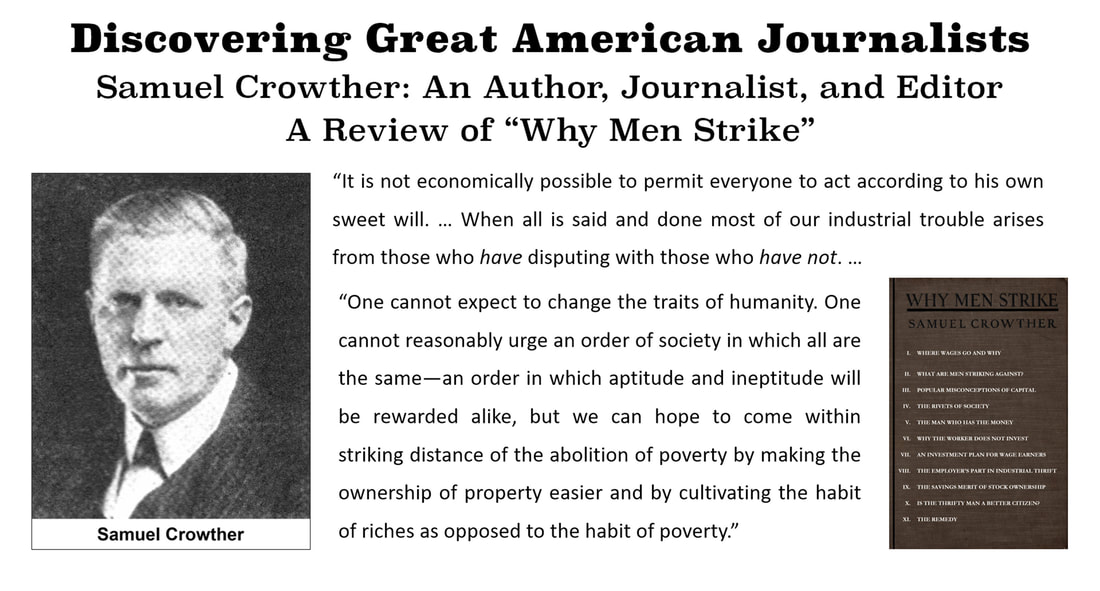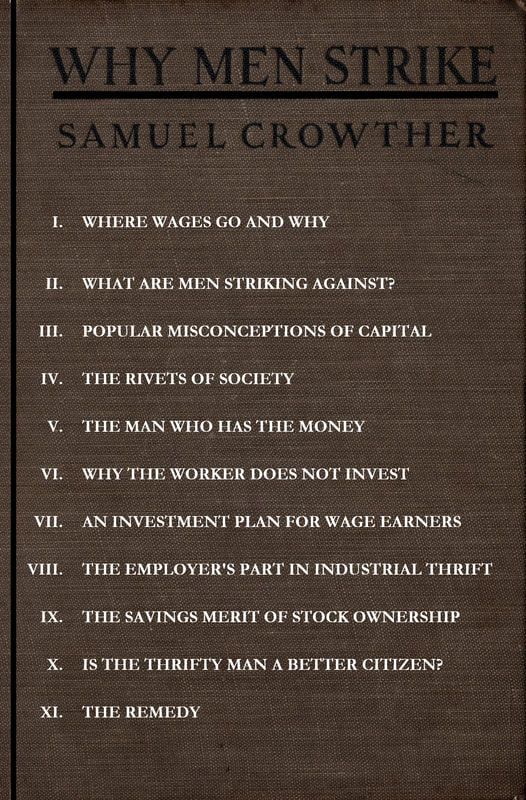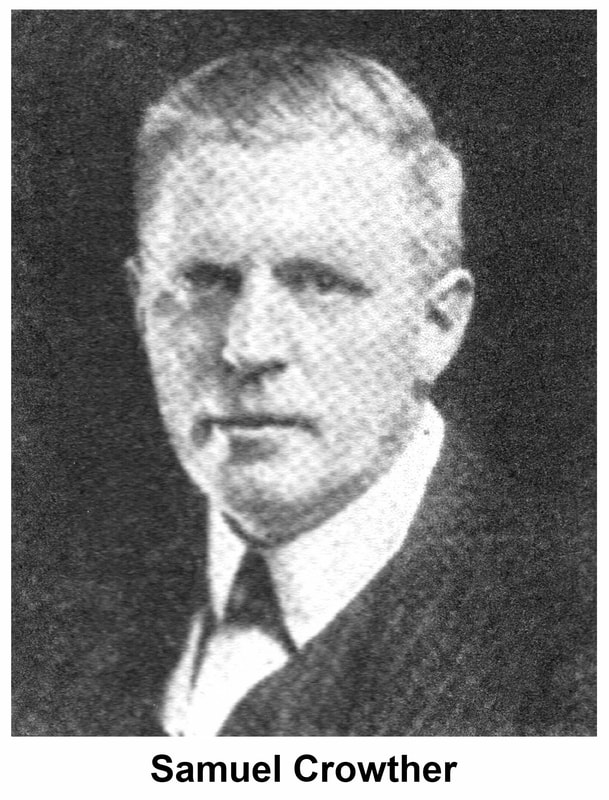A Review of “Why Men Strike” by Samuel Crowther
- Reviews of the Day: 1920–21
- Interesting Insights from “Why Men Strike”
- This Author’s Perceptions of Samuel Crowther’s “Why Men Strike”
Reviews of the Day: 1920–21
“Mr. Crowther is a sound economist and an authority on the relations of capital and labor both in this country and Europe. … It is his conviction that the real cause of the present unrest lies in the misconception on the part of not only workers but also the employers, of the real function and ownership of capital. The strikes are against capital as such and are due to the feeling that the fruits of labor are unjustly distributed and that in the industrial organization capital gains everything and labor nothing.
“His conclusion is that the possibility of a death struggle between capital and labor can be averted only if the margin of labor’s wages be returned to capital, thus, when all are capitalists, the ground for profound differences between employer and employed will be removed.”
“His conclusion is that the possibility of a death struggle between capital and labor can be averted only if the margin of labor’s wages be returned to capital, thus, when all are capitalists, the ground for profound differences between employer and employed will be removed.”
“Why Men Strike,” The Altoona Tribune, 1920
“The author declares that, to his knowledge, a simple proposition has never been impressed upon any body of workers that they could raise their real wages more quickly by investing in industry than they can by striking against industry.
“Very few workers, he writes, have ever examined this economic equation and moreover very few employers have looked into it.”
“Very few workers, he writes, have ever examined this economic equation and moreover very few employers have looked into it.”
“An Antidote for Strikes,” The Indianapolis Star, 1920
|
“There is so little sense of any kind in our strikes, or our strike talks, that one reads with all the more pleasure Mr. Crowther’s Why Men Strike, … which is to be published immediately in this country (England) by George G. Harrap and Company. …
The discussion is only too topical. … |
The London Daily Mirror, 1920
|
“Mr. Crowther is … for a prosperous laboring class; but he shows that the strike does not increase real wages. It simply beggars production. He offers … an attractive alternative, ‘The possibility of a death struggle between Capital and Labour will be avoided only when we all become capitalists.’
“That is the real clue.”
“That is the real clue.”
“Why the Strike is a Boomerang,” The London Daily Mirror, 1920
Interesting Insights from “Why Men Strike”
- A Properly Defined “Thrift” Is the Way Forward for Labor
|
“We often get a wrong start on thrift. We think of it only as buying less [or suffering with less] whereas we should think of it as buying more wisely. … We know that buying less does not increase production, but, on the contrary, decreases production because the demand falls. …
“The purpose of thrift is to provide more working capital so that the means of adding to the wealth of the nation may be augmented. Adding to the productivity of the nation increases the stock of goods for distribution and not only increases the buying power by decreasing the price of commodities, but also increases the wage of the worker by increasing the demand of capital for labour. “That is the big fact in thrift: It is not merely a virtue." - Properly Defined Thrift is Simply Common Sense “Thrift followed by investment is simply common sense. Thrift has not been popular because it has been represented solely as a kind of morality which might be achieved by sufficient chastisement of the soul.
|
"Why Men Strike" Table of Contents
|
"To my knowledge it has never been impressed upon any body of workers that they could raise their real wages more quickly by investing in industry than they could by striking against industry. … Thrift is not merely a virtue. It … adds to the productivity of the nation … which decreases the price of commodities … which increases the buying power of the wage earner. …
“We do not say that a manufacturer is virtuous who puts back a large portion of his earnings into his plant and equipment in order to be able to earn more. I have never heard any one extol the virtues of the big packing companies because they have most signally increased their productivity and their earnings by, for many years past, putting back the larger share of their earnings into their packing establishments.”
[This author would add that manufacturers’ spare capital was also not spent on stock buybacks—this is a uniquely 21st Century phenomenon … the newest way to waste capital. Investments should be made in business-first projects that make people more productive, processes more effective, products more valuable, and build stable, self-sufficient, stakeholder ecosystems. This has been a constant finding in my studies of successful 20th Century American industrialists.]
“We do not say that a manufacturer is virtuous who puts back a large portion of his earnings into his plant and equipment in order to be able to earn more. I have never heard any one extol the virtues of the big packing companies because they have most signally increased their productivity and their earnings by, for many years past, putting back the larger share of their earnings into their packing establishments.”
[This author would add that manufacturers’ spare capital was also not spent on stock buybacks—this is a uniquely 21st Century phenomenon … the newest way to waste capital. Investments should be made in business-first projects that make people more productive, processes more effective, products more valuable, and build stable, self-sufficient, stakeholder ecosystems. This has been a constant finding in my studies of successful 20th Century American industrialists.]
- Money Is a Valuable Means of Exchange
“Money is merely a convenient counter by which we measure value. … The wealth of our country consists not in little stores of gold … or the quantities of bank or treasury notes … but in the actual commodities produced by work. … The value of money depends upon the supply of commodities. … and money is the medium in which working class folks work for each other: for example, ‘A’ bakes bread, ‘B’ hews coal, ‘C’ mends boots, and ‘A’ and ‘B’ and ‘C’ exchange with each other through the medium of money.
“A uniform rise of prices benefits no one, while a rise in one industry is at the expense of others.”
“A uniform rise of prices benefits no one, while a rise in one industry is at the expense of others.”
- Who or What Makes Wages Possible?
“It does not require any deep-seated erudition to discover, for all practical purposes, what capital is and what capital does. For instance, take the prevailing idea, preached from every soap box, that capital pays wages. It does nothing of the kind. … Capital rarely consists of money, and when it is money, it is non-productive and of no use to its owner.
“Wages must be paid out of production; what capital does is to provide the means for production.”
“Wages must be paid out of production; what capital does is to provide the means for production.”
- One Liner on Dealing with Anarchists and Socialists
“You can deport the holders of ideas, but you cannot deport the ideas.”
This Author’s Perceptions of Samuel Crowther’s “Why Men Strike”
|
Samuel Crowther was no believer in Adam Smith’s “invisible hand.” He states quite clearly in “Chapter VIII: The Employer’s Part in Industrial Thrift” that, “It is not economically possible to permit everyone to act according to his own sweet will.” Of course, this was written in 1920 after the United States had experienced the Age of John D. Rockefeller Sr. through Standard Oil and during the Depression of 1920–21 which was affecting those who Samuel Crowther worked closely with such as Henry Ford and Harvey S. Firestone.
The book’s conclusion reveals the results of Samuel Crowther’s research and his hope in the writing of this book. This conclusion must be understood within the context of his belief that: “Making a gift to a man—giving him something that he does not even remotely earn, whether it be in the form of a bonus unrelated to work or a sharing of the profits which the man did not help make, promotes spending, not ownership.” |
Ultimately, Mr. Crowther wanted labor to be a direct beneficiary of and an owner of capital—a capitalist. He concludes his book in this way:
“When all is said and done most of our industrial trouble arises from those who have disputing with those who have not. One cannot expect to change the traits of humanity. One cannot reasonably urge an order of society in which all are the same—an order in which aptitude and ineptitude will be rewarded alike, but we can hope to come within striking distance of the abolition of poverty by making the ownership of property easier, by cultivating the habit of riches as opposed to the habit of poverty—in short, by making the social competition … that which exists between the several grades of those who have and abolishing the competition between those who have and those who have not.
“Instead of destroying Capital why not destroy Poverty?
“And why not start now?”
This author would love to spend time with this economist and journalist … this 1920’s seeker of a better way of life for all human beings. I would love to show this man—who wrote about the need to make saving easier for the average working individual that today’s wages can be transferred directly into a bank account, and how in minutes an individual can open an investment account in stocks to receive funds from that bank account, and, finally, show him how reports are generated that document how much the worker’s capital has made [or lost] that day, week, month, quarter, or year-to-date. The later of these—reports of capital returns, Mr. Crowther would have been unable to even conceive of in 1920—seven decades before the internet made such things a possibility.
I think he might say, “All my dreams have been addressed! All workers can receive the benefits of having capital work for them. They can be capitalists!” Then he would ask, “Has poverty been eliminated?” I think the mist in my eyes would declare not and put him, once again, back to work to figure out the next steps to better humanity.
Samuel Crowther's "Why Men Strike" is readable and enjoyable for anyone who wants to understand that we of the 21st Century are in many ways living the dreams of those who envisioned a better way. We need to practice Samuel Crowther’s definition of thrift—buying more wisely so as to invest the savings, and then display Samuel Crowther’s courage, determination, and belief in mankind so that humanity can continue on its ever upward spiral. If we make the way better for others, we will make a better way for everyone.
In other words, we need to answer the question—a question our meritocracy has wrestled with for more than two centuries: “How do the adept help the inept achieve an industrial aptitude worthy of top wages?”
Cheers,
- Pete
I think he might say, “All my dreams have been addressed! All workers can receive the benefits of having capital work for them. They can be capitalists!” Then he would ask, “Has poverty been eliminated?” I think the mist in my eyes would declare not and put him, once again, back to work to figure out the next steps to better humanity.
Samuel Crowther's "Why Men Strike" is readable and enjoyable for anyone who wants to understand that we of the 21st Century are in many ways living the dreams of those who envisioned a better way. We need to practice Samuel Crowther’s definition of thrift—buying more wisely so as to invest the savings, and then display Samuel Crowther’s courage, determination, and belief in mankind so that humanity can continue on its ever upward spiral. If we make the way better for others, we will make a better way for everyone.
In other words, we need to answer the question—a question our meritocracy has wrestled with for more than two centuries: “How do the adept help the inept achieve an industrial aptitude worthy of top wages?”
Cheers,
- Pete



